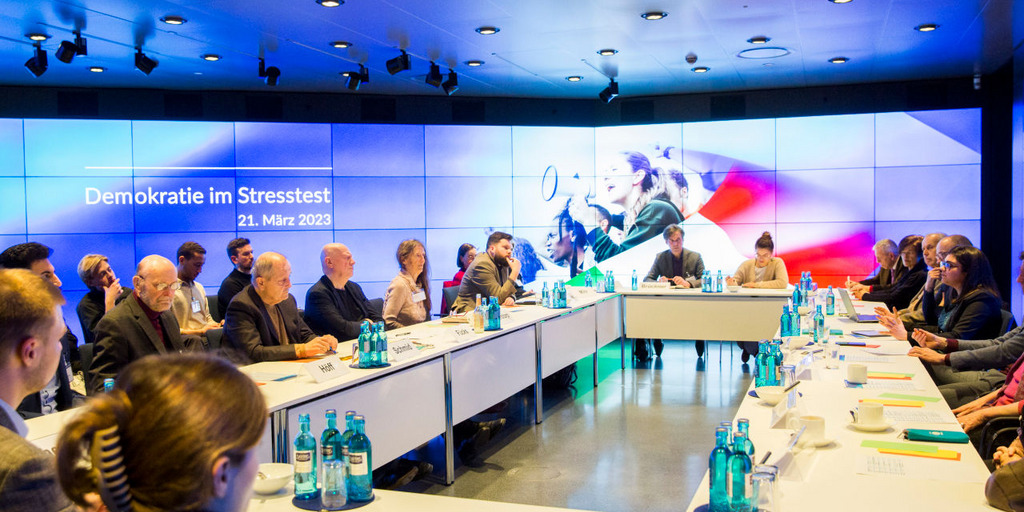These were the questions asked in the latest edition of the "Democracy in a Stress Test" series, co-hosted by the Bertelsmann Stiftung and Zentrum Liberale Moderne. The event was opened by political philosopher Roberta Astolfi and former WELT editor-in-chief and renowned expert on Italy and Italian politics Thomas Schmid.

© Sebastian Pfütze
Italy under Meloni: Right-Wing Turn, Populism or Resilient Democracy?
Italy has voted - and Europe is listening. What is happening in the EU's fourth-largest economy, which is used to populism, knows frequent government change and whose economy has been weakening for years? Is the election of the coalition led by Giorgia Meloni, Italy's first female prime minister, a shift to the right or a normal change of government? Is there a threat of a slow decomposition of democracy, as exemplified by Hungary and Poland, or does the election rather speak for the stability of Italian democracy?
Content
Meloni's position is consolidated
Two developments can be noted: Giorgia Meloni is firmly in the saddle after two important regional elections - in Lazio and Lombardy her party enjoyed a clear victory. The government has also followed quite a little from the usual "populist playbook" – the media is free, civil society or the courts are not under attack. Unlike most right-wing populists, the Italian government stands by Western ties, NATO, supports Ukraine and the EU. So, is it a normal, conservative government in a country that has not sufficiently dealt with its fascist past? Or is our assessment only so positive because the Italian government clearly stands by the West?
Picture gallery
Discipline or techno-populism?
Why does the government govern so inconspicuously? Two theses have been discussed. One assumes the Italian government is being disciplined by (functioning) institutions. The government must now deliver - not just produce impressive election results. As a government, one has to abide by contracts, keep promises, the administration makes legally binding legislative proposals, the economy has to run, and the public watches - all of this limits Meloni's ability to act.
The other side countered: Meloni's government was an expression of the phenomenon of techno-populism, a combination of populism and technocracy. Meloni and her party had set out from the beginning to shape things through co-government, not through populism from the opposition. So was populism just electioneering, coupled with the unaddressed legacy of the fascism of Fratella d'italia and Italy?
A strong civil society gives hope
The strength of the right in Italy, the participants agreed, is actually rather a weakness of the left. The conservative bloc is united whereas the left is torn by disputes. In addition, there is a high number of non-voters and a perceived representation gap, especially on the left. Many people have difficulty finding their political position along the party spectrum.
However, Italy has a broad, active civil society, vital local politics, and intellectuals are increasingly getting involved in political debates again instead of remaining in their ivory towers. All of this - in addition to functioning institutions and the government's strong ties to the EU and the West - gives hope for a resilient democracy in Italy.

![[Translate to English:] Mann hebt Hand](/fileadmin/files/_processed_/e/a/csm_BST_DiStress_21.3.2023-7401_01_e1043440de.jpg)


